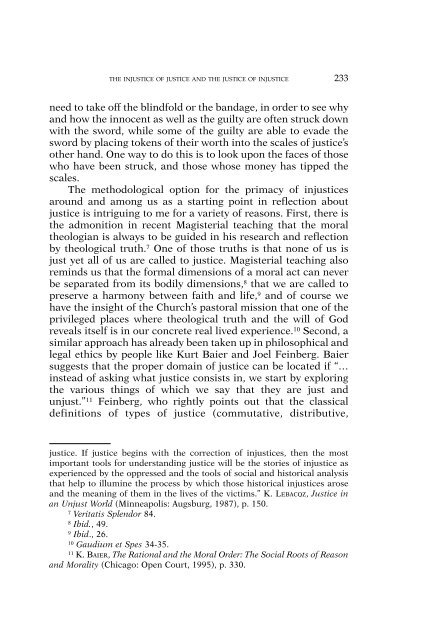Vol. XXXVIII / 1 - Studia Moralia
Vol. XXXVIII / 1 - Studia Moralia
Vol. XXXVIII / 1 - Studia Moralia
You also want an ePaper? Increase the reach of your titles
YUMPU automatically turns print PDFs into web optimized ePapers that Google loves.
THE INJUSTICE OF JUSTICE AND THE JUSTICE OF INJUSTICE 233<br />
need to take off the blindfold or the bandage, in order to see why<br />
and how the innocent as well as the guilty are often struck down<br />
with the sword, while some of the guilty are able to evade the<br />
sword by placing tokens of their worth into the scales of justice’s<br />
other hand. One way to do this is to look upon the faces of those<br />
who have been struck, and those whose money has tipped the<br />
scales.<br />
The methodological option for the primacy of injustices<br />
around and among us as a starting point in reflection about<br />
justice is intriguing to me for a variety of reasons. First, there is<br />
the admonition in recent Magisterial teaching that the moral<br />
theologian is always to be guided in his research and reflection<br />
by theological truth. 7 One of those truths is that none of us is<br />
just yet all of us are called to justice. Magisterial teaching also<br />
reminds us that the formal dimensions of a moral act can never<br />
be separated from its bodily dimensions, 8 that we are called to<br />
preserve a harmony between faith and life, 9 and of course we<br />
have the insight of the Church’s pastoral mission that one of the<br />
privileged places where theological truth and the will of God<br />
reveals itself is in our concrete real lived experience. 10 Second, a<br />
similar approach has already been taken up in philosophical and<br />
legal ethics by people like Kurt Baier and Joel Feinberg. Baier<br />
suggests that the proper domain of justice can be located if “…<br />
instead of asking what justice consists in, we start by exploring<br />
the various things of which we say that they are just and<br />
unjust.” 11 Feinberg, who rightly points out that the classical<br />
definitions of types of justice (commutative, distributive,<br />
justice. If justice begins with the correction of injustices, then the most<br />
important tools for understanding justice will be the stories of injustice as<br />
experienced by the oppressed and the tools of social and historical analysis<br />
that help to illumine the process by which those historical injustices arose<br />
and the meaning of them in the lives of the victims.” K. LEBACQZ, Justice in<br />
an Unjust World (Minneapolis: Augsburg, 1987), p. 150.<br />
7<br />
Veritatis Splendor 84.<br />
8<br />
Ibid., 49.<br />
9<br />
Ibid., 26.<br />
10<br />
Gaudium et Spes 34-35.<br />
11<br />
K. BAIER, The Rational and the Moral Order: The Social Roots of Reason<br />
and Morality (Chicago: Open Court, 1995), p. 330.
















